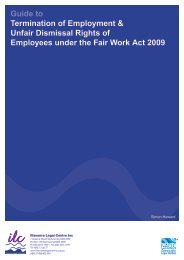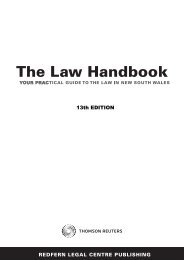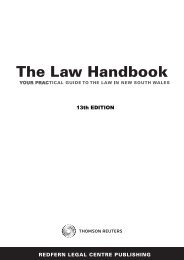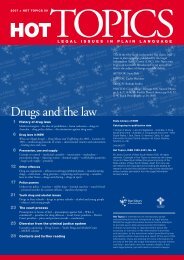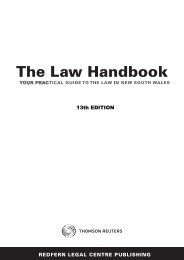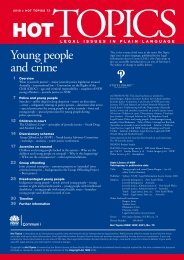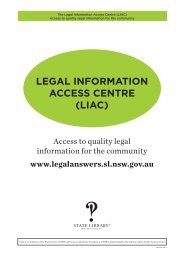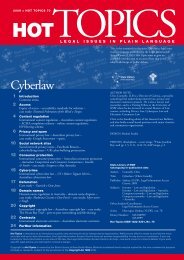Hot Topics 64 - Health and the Law - Legal Information Access Centre
Hot Topics 64 - Health and the Law - Legal Information Access Centre
Hot Topics 64 - Health and the Law - Legal Information Access Centre
You also want an ePaper? Increase the reach of your titles
YUMPU automatically turns print PDFs into web optimized ePapers that Google loves.
Objective risk information is best given with <strong>the</strong><br />
assistance of printed materials with adequate time for<br />
<strong>the</strong> patient to reflect upon it <strong>and</strong> discuss it with friends<br />
<strong>and</strong> relatives. More information about material risks is<br />
required for a ‘cosmetic’ procedure than for surgery that<br />
is clinically indicated for preservation <strong>the</strong> patient’s life<br />
or immediate health <strong>and</strong> would have been proceeded<br />
with regardless of <strong>the</strong> answer given. Serious risks, like<br />
death, stroke or paralysis should be mentioned even<br />
if <strong>the</strong>y are remote. Relatively minor injuries – such as<br />
bruising after a doctor has inserted a plastic cannula into<br />
a vein, or damage to <strong>the</strong> front teeth on intubation by<br />
an anaes<strong>the</strong>tist – may be material if <strong>the</strong>y are frequent.<br />
Unusually inquisitive patients may need to be given<br />
more risk information: see Chappel v Hart.<br />
9<br />
Patients should ask for <strong>the</strong> risk information to be given<br />
to <strong>the</strong>m in writing so <strong>the</strong>y are able to take time to<br />
consider it at home. When asked to sign a ‘consent form’<br />
<strong>the</strong> patient should ensure that <strong>the</strong>y are able to think<br />
clearly; that <strong>the</strong>y have not been given a ‘pre-med’, for<br />
example, or are unable to think clearly for some o<strong>the</strong>r<br />
reason. If <strong>the</strong>y have particular concerns, <strong>the</strong>y should<br />
be sure to note <strong>the</strong>se on <strong>the</strong> form, or have <strong>the</strong> doctor<br />
record <strong>the</strong>m, as well as any answers given. If language<br />
is a difficulty <strong>the</strong>y should ask for a translator. Even if a<br />
patient signs a consent form, this is not conclusive proof<br />
that all <strong>the</strong> matters mentioned in <strong>the</strong> form have been<br />
discussed with <strong>the</strong> patient or understood by <strong>the</strong>m.<br />
The doctor should mention whe<strong>the</strong>r he or she has any<br />
conflict of interest (for example, holding shares or a<br />
managerial position in a company marketing a product<br />
or device that will be used in <strong>the</strong> procedure). If <strong>the</strong><br />
doctor also wants to include you in a research project,<br />
that consent discussion should take place separately.<br />
WHen maY less infOrmaTiOn Be<br />
giVen?<br />
There are several situations in which less information<br />
may be justifiable.<br />
The first is in an emergency. Treatment may be given<br />
without any information or consent if it is necessary<br />
to protect <strong>the</strong> patient’s life or health (Guardianship<br />
Act 1987 (NSW), s 37(1)). If, for instance, a patient<br />
is unconscious, a health professional may perform<br />
whatever procedures are reasonably necessary in <strong>the</strong><br />
circumstances to preserve <strong>the</strong> patient’s life or health. It is<br />
not necessary to obtain <strong>the</strong> consent of <strong>the</strong> patient’s next<br />
of kin, although that is generally done as a courtesy.<br />
The second case in which less information may be<br />
required is when <strong>the</strong> patient waives <strong>the</strong> right to be<br />
given information. Ethically, a doctor should confirm<br />
that <strong>the</strong> reasons behind such a refusal do not involve a<br />
misunderst<strong>and</strong>ing.<br />
The third situation is a doctor’s limited discretion<br />
(<strong>the</strong>rapeutic privilege) not to disclose information where<br />
he or she has reasonable grounds to believe, <strong>and</strong> is<br />
prepared to document, that disclosure of <strong>the</strong> information<br />
may itself harm <strong>the</strong> patient (for example, if <strong>the</strong> patient<br />
is suicidal or mentally ill). Mere anxiety in <strong>the</strong> patient is<br />
not a sufficient reason under this ground for a doctor to<br />
withhold information; see Rogers v Whitaker . 10<br />
capaciTY TO cOnsenT<br />
The principles that people may not be given medical<br />
treatment without <strong>the</strong>ir consent, <strong>and</strong> that <strong>the</strong>y are<br />
entitled to adequate information to make an informed<br />
choice, apply to competent adults (that is, to people over<br />
18 who are able to underst<strong>and</strong> <strong>the</strong>ir condition <strong>and</strong> <strong>the</strong><br />
options for treatment). The same applies to withholding<br />
consent <strong>and</strong> refusing treatment.<br />
If <strong>the</strong> person is a child (under 18), ei<strong>the</strong>r parent or a<br />
guardian may generally consent to a medical procedure<br />
<strong>and</strong> <strong>the</strong> parent or guardian is entitled to <strong>the</strong> same<br />
information as an adult patient. However, an older<br />
child may also be able to consent if sufficiently mature<br />
to underst<strong>and</strong> <strong>the</strong> procedure. This will depend on<br />
<strong>the</strong> child’s age <strong>and</strong> level of maturity <strong>and</strong> also on <strong>the</strong><br />
particular procedure. Even relatively young children<br />
can consent to simple procedures for <strong>the</strong>ir own<br />
good, such as a vaccination. On <strong>the</strong> o<strong>the</strong>r h<strong>and</strong>,<br />
greater maturity <strong>and</strong> underst<strong>and</strong>ing will be required<br />
for procedures that are risky or contentious, such as<br />
contraception (Gillick’s case [1986] AC 112). In <strong>the</strong><br />
cases of abortion, reproductive sterilisation, or medical<br />
procedures concerned with contraception of a mentally<br />
h<strong>and</strong>icapped minor, <strong>the</strong> parent or appointed guardian<br />
alone cannot consent <strong>and</strong> <strong>the</strong> guardianship tribunal<br />
must be involved <strong>and</strong> possibly a court (Guardianship Act<br />
1987 (NSW) Part 5; Marion’s case 11 ).<br />
People who have an intellectual disability or mental illness<br />
may not be able to consent to medical treatment. Again,<br />
this will depend on <strong>the</strong> patient’s level of underst<strong>and</strong>ing<br />
(which may fluctuate) <strong>and</strong> <strong>the</strong> nature of <strong>the</strong> procedure.<br />
If <strong>the</strong> impairment is slow to develop, persons may make<br />
an enduring power of attorney allowing a nominated<br />
person to give consent to lawful medical treatment<br />
on <strong>the</strong>ir behalf <strong>and</strong> to its withholding or withdrawal<br />
(Powers of Attorney Act 2003 (NSW) Part 4).<br />
If a person has impaired decision-making capacity due<br />
to permanent or long-term disability, <strong>and</strong> is over 18,<br />
consent may be given by a person appointed under <strong>the</strong><br />
Guardianship Act 1987 (NSW).<br />
9. Chappel v Hart [1998] HCA 55, per Kirby J at [99], available at www.austlii.edu.au/au/cases/cth/HCA/1998/55.htmll<br />
10. Available online at http://www.austlii.edu.au/au/cases/cth/HCA/1992/58.html<br />
11. Secretary, Department of <strong>Health</strong> <strong>and</strong> Community Services v JWB <strong>and</strong> SMB (Marion’s case) [1992] HCA 15;<br />
available at www.austlii.edu.au/au/cases/cth/HCA/1992/15.html<br />
Overview of <strong>Health</strong> <strong>Law</strong> in Australia 5





